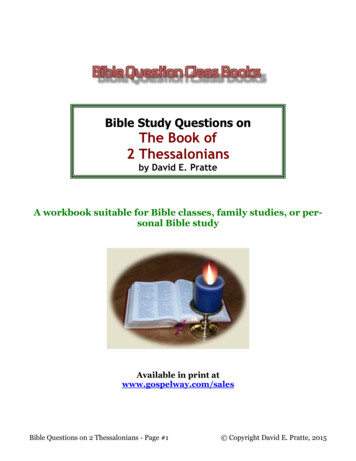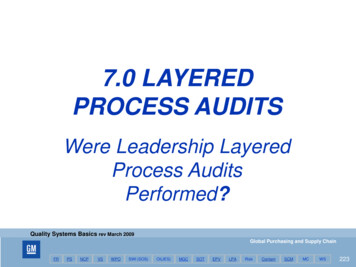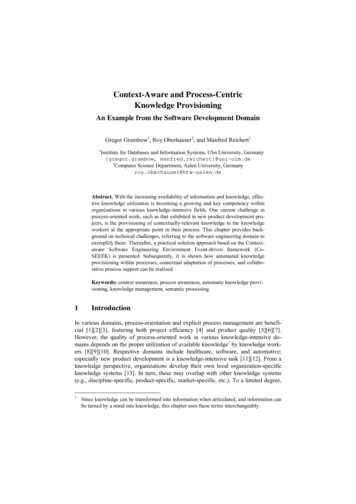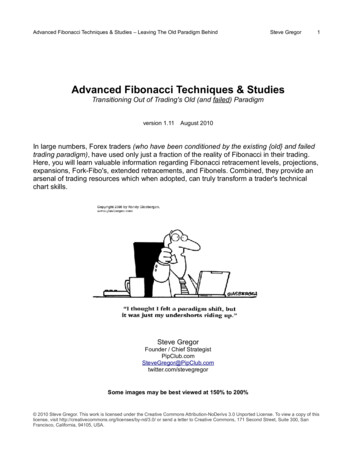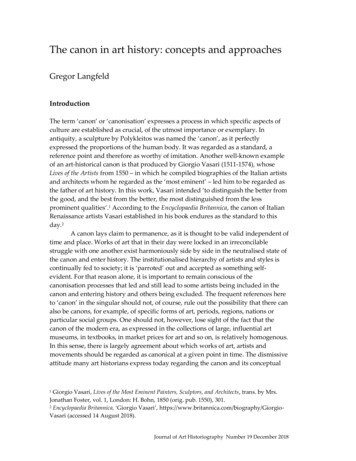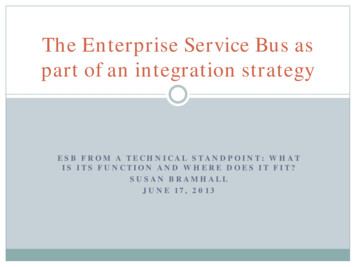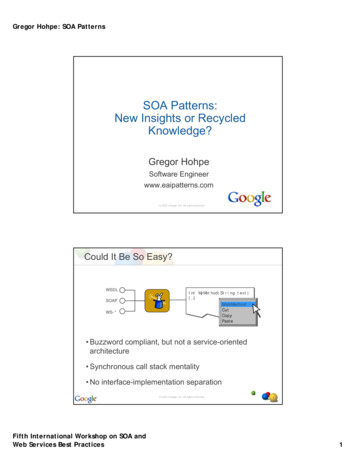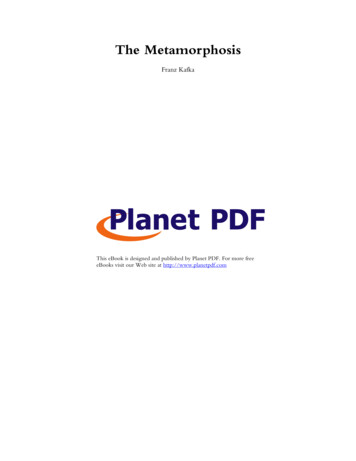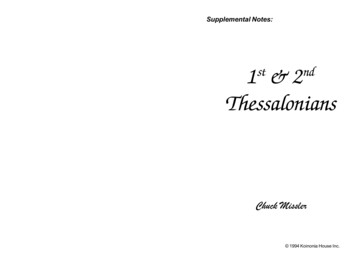
Transcription
Supplemental Notes:1 &2ThessaloniansstndChuck Missler 1994 Koinonia House Inc.Page 1
Audio ListingI ThessaloniansIntroduction1 Thessalonians - Introduction & Chapter 1An introduction to the earliest book of the New Testament; an amazinginsight into what Paul taught these new Christians in their first threeweeks. (Includes a review of the background from the Book of Acts.)Theme of the Letter (from Apostle Paul)1 Thessalonians 21)Confirm the foundational truths they’d been taught.2)Exhort them to personal holiness.3)Comfort them concerning departed loved ones.4)Remind them of their Blessed Hope.The greatest missionary manual ever written.1 Thessalonians 3Review of Paul in Acts (“Luke Volume 2”)Practical examples and instructions about caring.Chapter:1 Thessalonians 49Our Blessed Hope: The Rapture of the Church. (An issue of ecclesiologyrather than eschatology alone.) The ultimate non-linearity.1 Thessalonians 5A history of “rapture-mania.” The Day of the Lord.2 Thessalonians 1“3rd Thessalonians”: Paul’s response to a forgery. “Pre-Tribulation,”“Mid-Tribulation,” and “Post-Tribulation” views.2 Thessalonians 2:1-16: The Day of the LordOne of the most important prophetic chapters in the New Testament. Therevelation of the Man of Sin and its prerequisite events. The Restrainer.2 Thessalonians 2:13-17 & 2 Thessalonians 3Exhortations: Prayerfulness, Preservation, Protection, and Patience.Page 2Damascus Road: Paul was converted.Biographical Notes: Paul was born in Tarsus, the principal city of theRoman province of Cilicia, in southern Asia Minor. Born a free Romancitizen (Acts 22:28) with full rights as a citizen of Tarsus (Greek). Hequotes from the Septuagint (LXX). Raised by strict Jewish parents: APharisee (2 Cor 11:22; Phil 3:5). Studied under Gamaliel at Jerusalem (Acts22:3). “Saul” commemorates another Benjamite. Saul (Saulos), Grecianizedfor Hebrew Shaoul (“asked for”). Paul was his Roman name (“little”).10 Peter at Cornelius’ house: Door opened to Gentiles.13 First Missionary Journey: Traveled to Seleucia, Cyprus (Paphos),Perga, and Antioch in Pisidia; Paul turns to the Gentiles.14 Traveled next to Iconium, Derbe, and Lystra (stoned). Afterwards, hereturned to Antioch.15 Council at Jerusalem: 2nd Missionary Journey (15:36) Traveled toCyprus, Syria, and Cilicia.16 Traveled to Derbe and Lystra. Timothy joins Paul and Silas. Traveledto Phygia, and the region of Galatia. Forbidden by the Spirit to preachin Asia.Page 3
The Vision at the ancient city of Troy: The Man of Macedonia (Luke?).“We”: Luke joins in v.10?—May have met him earlier in Antioch. Greekfreedman of a Roman family. (Julius Caesar had bestowed Romancitizenship upon all physicians in Rome.)10] Paul and Silas flee to Berea (50 miles westward; three-day journey?)11] [Trademark passage.] They verified the OT prophecies.15] Athens & Mars’ Hill.Enters Europe: Philippi—Jailed and released.Acts Chapter 17: ThessalonicaActs Chapter 18: CorinthPaul may have been here for two years (Acts 18:11 & 18). He writes bothThessalonian letters from here, perhaps within weeks of visiting there.Thessalonica was the capital of Macedonia Secunda. It was founded in315 B.C. by Cassander, son-in-law of Philip of Macedon and one ofAlexander’s four key generals, who named it after his wife Thessalonike,the half-sister of Alexander the Great.Timothy had been left in Philippi, and joins Paul in Berea (Veria) andtravels with him to Athens. Paul sent him back to Thessalonica. The firstletter is in response to Timothy’s rejoining Paul in Corinth with his report(1 Thess 3:6-7; Acts 18:5).Strategic location: It has a natural harbor at the head of the Thermaic Gulf;situated on Via Egnatia, the main route between Rome and the East.I ThessaloniansChapter 1It was the most populous town of Macedonia, practically the capital ofGreece, Illyricum, and Macedonia. (Perhaps 200,000 lived there in Paul’sday.) Cicero was in exile here in 58 B.C.This letter initiates the New Testament documents! Written less than20 years after Christ’s resurrection. (Some believe Galatians was writtenbefore Acts 15.) Every chapter refers to the Second Coming.Thessalonica was almost made the capital of the world; presently thesecond most important city in Greece.Antony and Octavius (the future Augustus) were here after their victoryat Philippi. In gratitude for their cooperation in the struggle againstCassius and Brutus, Thessalonica was made a free city like Athens. NoRoman soldiers were stationed in it; government was in the hands of apeople’s assembly, from whom the “politarchs” (magistrates) werechosen. Kingdom preaching would make them fearful of losing theirprivileges of “free” status.Verse:2]Three Sabbaths!? Preached entirely from the OT (including the raptureand the Second Coming!) See our briefing package, Footprints of theMessiah. His stay may have been longer (note Phil 4:16).4]Mostly Gentile converts? (Note absence of OT references in hisThessalonian letters—also, idolatry reference in 1:9.)5]Riot organized. Jason posts bond. As in Philippi, they were vulnerableto the charge of treason due to the recent expulsion of Jews from Rome.Page 4Purpose of the Letter Writer’s joy at their steadfastness.Refute certain false charges and slanderous insinuations beingcirculated.Personal attacks; assailed motives; self-seeking; cowardice.Concern over loved ones who have passed on.Chapter 1: How the Church Spreads the Gospel1]The three of them were together at Corinth; no evidence that the threewere ever together again.It is remarkable how often Paul speaks of bearing up God’s people inprayer! He was a busy guy, yet he found time for prayer.Silvanus (Roman): god of the woods; woodland. (Luke always calls himSilas; Paul, always Silvanus. Cf. Acts 18:5, 2 Cor 1:19.) He was anPage 5
esteemed member of the Jerusalem council (Acts 15:22); a prophet(15:32); Roman citizen (16:37); in hearty agreement with the Councildecision regarding Gentile believers in Acts 15:22-32; fitting co-workerand preacher (2 Cor 1:19). Amanuensis for 1 Peter (5:12).Faith vs. “works”.Patience (steadfastness): active constancy in the face of difficulties.Hope: future, yet completely certain.Timotheos, “honoring God; 24X (half-Jew; half-Greek). Co-salutation infive of Paul’s epistles.Love (kopos): fatiguing labor to the point of weariness.Ekklesia, called out assembly; called out from their homes to assemble.LXX: assembled people of God. The church is never a building, “Thesanctuaries are chewing gum.”Greek words for Love—Storge, Eros, Phileo, Agape: Agapao (v): to betotally given over to (Cf Jn 3:19; et al.). Agape (n): God’s love (Cf 1 Jn4:10).Lord: from YHWH in LXX.Faith, love, and hope conjoined: 5:8; 1 Cor 13:13; Gal 5:5f; Col 1:4f; Heb6:10-12, 10:22-24; 1 Pet 1:21f. Faith rests on the past; love works in thepresent; hope looks to the future.Jesus: Derived from the Latinization of the Greek transliteration of theHebrew Joshua, which is an abbreviation for Jehoshua, “YHWH issalvation” (Mt 1:21).Each looks outward:Faith looks back to a Crucified Savior;Love looks up to a Crowned Savior;Hope looks on to a Coming Savior.Christ: Greek equivalent of the Hebrew Meshiach, or Messiah, theanointed one.“In” God: Not spatial, but positional; a vital, organic union which makespossible the sharing of a common life.Geometry of Eternity: open hyperbola intersects our linear time right“now.”Grace (Greek), chairein, to rejoice, greetings; Peace (Hebrew), shalom,peace, prosperity, well being; prosperity in the widest sense. Grace: freeand unmerited favor of God; Peace: result of receiving the grace of God,it’s that precious sense of inner tranquility and well-being from beingreconciled to God through Christ.The Church is distinguished by these three.faith, hope, and love.[Characteristic of Paul’s writing: If he finished his sentence, it wouldhave been complete and well designed. But his thoughts continue toverse 5 and beyond. They grow like living things rather than beingconstrained by rules. sometimes, “Finally, my brethren,” means only afew chapters to go!]First three chapters: personal.Second two chapters: practical.2]Thanksgiving: a priority; continual. Give thanks in everything (5:18; 2Cor 4:15; 9:11ff). “The Spirit of Christ is the oil that feeds the lamp ofpraise.”Divine ElectionAffection: he tried twice to return (1 Thess 2:17-18).4]3-10] The Grounds of Thanksgiving: virtues; election; results witnessed.3]These three graces would be featured later in the Corinthian letter: thework of faith, the patience of hope, and the labor of love.Page 6Luke 4:23-29 (?)Brethren: Born into the relationship. Paul uses this word 60X; 14X in 1Thess; 7X in 2 Thess 21.OT: national election. NT: individual and spiritual (Jn 13:18; 15:16; Acts9:15; Jas 2:5; 1 Pet 1:10).Page 7
Love and election connected: 2 Thess 2:13. Election protects us fromthinking of salvation as dependent on human whims and roots itsquarely in the will of God. Left to ourselves, we do not wish to leaveour state of untroubled orporate blessing:But he had the right perspective: the blessing of God was evidentin the work he was doing.not presumption;not moral apathy;not pride;not lazy selfishness.When did God first start dealing with YOU? You are not an afterthought:Eph 1:4. [Wilbur Smith: “I’m glad He chose me then. Now he mightchange His mind!”]Personal blessing:It is proof of a healthy Christian life when it becomes an example toothers.8]9]5]Words Power: .of the Holy Spirit!Serve, then wait.Turn: a radical change of allegiance. Re: Lystra (Acts 14); Athens (Acts17); from Thessalonica, Mt. Olympus was about 50 miles south of theircity. Turn from idols (God-substitutes). What are yours? Work? Career?Sports? USA?To serve (as a slave) the living (and active) and true (real, genuine) God.Beginning a new life of service.We must never divorce what God has married. Namely, His Word andHis Spirit (Eph 6:17). He himself is given to them as the Holy Spirit (1Thess 4:8); to perform His sanctifying work in their lives (2 Thess 2:13).To ignore or inhibit His manifestations is to “quench the Spirit” (1 Thess5:19).Every idolater is a prisoner, held in humiliating bondage. We become likethe gods we worship (Ps 135:18).The Spirit without the Word is weaponless;The Word without the Spirit is powerless.[Prophetic hope drives one toward personal holiness and evangelism.][The Word The Spirit The Koinonia House logo.]Opposition: Riots there (and in Berea). (Acts 17:5, 13.) Affliction “withjoy of the Holy Spirit.” How about us? Is it coming?6]Macedonia and Achaia were the northern and southern provinces intowhich the Romans divided the ancient land of the Greeks (Cf. Acts 17:6).Execheo, derived from echos, a loud noise, trumpet, thunderclap. Their“word of mouth” was more powerful than any media blitz.Knowing.the election of God. How? Their lives (new life) evidencedit (Cf Acts 1:18). To all of Macedonia and Achaia! You, not your words,are your witness.Church is God centered:Chosen by Him;Rooted in Him;Drawing its life from Him.Exhibiting this life in a faith that works, a love which labors, and ahope which endures.Example: tupon, the mark left by a blow, as when a die strikes an imageon a coin; Paul was discouraged when he arrived in Corinth (1 Cor 2:3).The authentic Gospel always arouses hostility because it challengeshuman pride and self-indulgence.Page 8Salvation does not begin with giving up something, but with receivingsomeone.10] “To wait for His Son” (“wait” only here in NT) (Sustained expectation;most frequently mentioned doctrine in New Testament: 1 out of every13 verses!)Parousia (mentioned in every chapter of both letters). Resurrection:public declaration that He will complete what He has begun. PropheticDeliverer from the wrath to come.Page 9
“Wrath is the holy revulsion of God against that which is a contradictionof his holiness.”Roman flogging was no light matter. They were arrested on a falsecharge; stripped of their clothes, publicly beaten without a trial, throwninto prison with their feet in stocks. Contrary to Roman law!He brings us completely out of the reach of future judgment.Sit-down strike: If any of Paul’s opponents charged that Paul had apolice record, he would’ve been quite willing to have the facts known.It was not Paul but the magistrates who had reasons to hide the truth.He arrived in Thessalonica still bleeding.Verses 9&10 give the fullest account of Christian “conversion” in theNew Testament:1) a decisive break with idols; turning; faith.2) an active service of God; fruit of love.3) a patient waiting for His Coming; the Blessed Hope.“Contention,” Agoni: athletic contest, arena; a struggle, a battle [doesn’timply tactlessness, devoid of common sense]. They had courage in spiteof persecution. Christian courage springs from the knowledge that Godis OUR God. (God is raising sons, not vegetables.)“turned.to serve.to wait.”ConclusionDoes YOUR life manifest your election? Is your study of the Wordaccompanied by the illumination of the Holy Spirit?1 ThessaloniansChapter 2Was Paul ever “careful”? When a Christian starts being “careful” inserving the Lord, the power goes out of his message. Never does theHoly Spirit lead one to “pussyfoot” around.3-6] Paul’s preaching was according to the Word of God. [Missing today.]“Not of deceit nor guile,” pure in its content and in its intent.notadulterated by human philosophy and human speculation (the K-Housemission).The most dangerous kind of preaching is that which is partly true.1-12] An elaboration of 1 Thess 1:9, “what manner of entering in we hadunto you”; why and how he preached.[v 3, 4: Characteristically Pauline: First sweep away the false; then withthe ground cleared, set forth the positive presentation of the truth.]13-16] How ye turned unto God from idols, to serve a living and true God—hearing; listening; doing.1]Temples in town: Aphrodite & Astarte, and the temples of Ap
Chuck Missler ' 1994 Koinonia House Inc. Page 2 Page 3 I Thessalonians Introduction Theme of the Letter (from Apostle Paul) 1) Confirm the foundational truths they d been taught. 2) Exhort them to personal holiness. 3) Comfort them concerning departed loved ones. 4) Remind them of their Blessed Hope. Review of Paul in Acts (fiLuke Volume 2fl) Chapter: 9 Damascus Road: Paul was converted .

